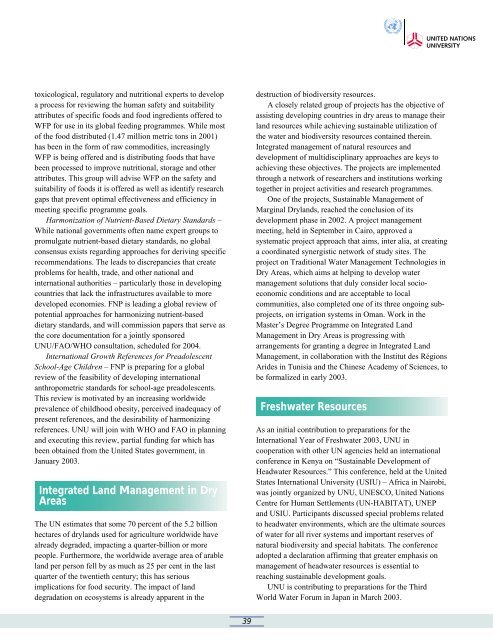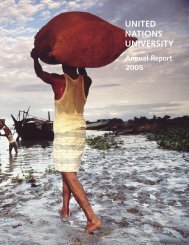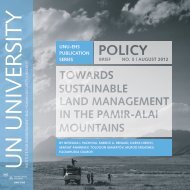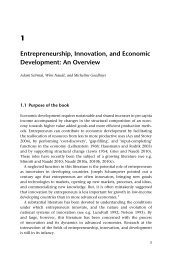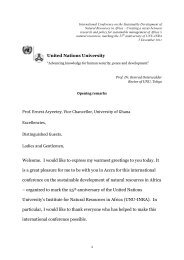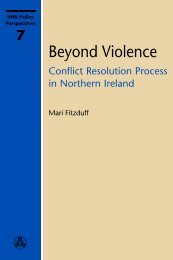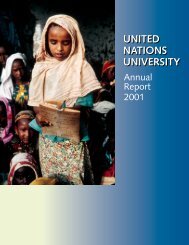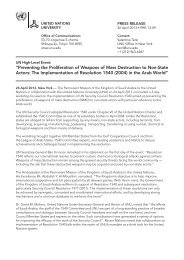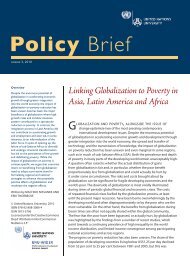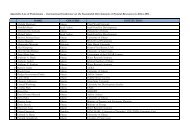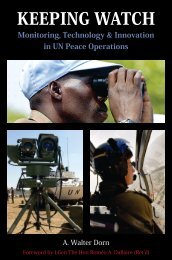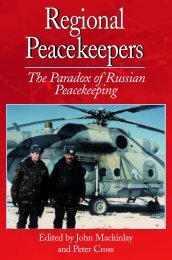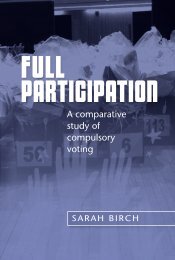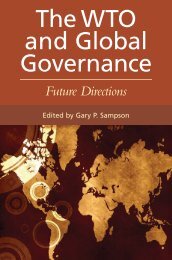Environment and Sustainable Development - United Nations ...
Environment and Sustainable Development - United Nations ...
Environment and Sustainable Development - United Nations ...
You also want an ePaper? Increase the reach of your titles
YUMPU automatically turns print PDFs into web optimized ePapers that Google loves.
toxicological, regulatory <strong>and</strong> nutritional experts to develop<br />
a process for reviewing the human safety <strong>and</strong> suitability<br />
attributes of specific foods <strong>and</strong> food ingredients offered to<br />
WFP for use in its global feeding programmes. While most<br />
of the food distributed (1.47 million metric tons in 2001)<br />
has been in the form of raw commodities, increasingly<br />
WFP is being offered <strong>and</strong> is distributing foods that have<br />
been processed to improve nutritional, storage <strong>and</strong> other<br />
attributes. This group will advise WFP on the safety <strong>and</strong><br />
suitability of foods it is offered as well as identify research<br />
gaps that prevent optimal effectiveness <strong>and</strong> efficiency in<br />
meeting specific programme goals.<br />
Harmonization of Nutrient-Based Dietary St<strong>and</strong>ards –<br />
While national governments often name expert groups to<br />
promulgate nutrient-based dietary st<strong>and</strong>ards, no global<br />
consensus exists regarding approaches for deriving specific<br />
recommendations. The leads to discrepancies that create<br />
problems for health, trade, <strong>and</strong> other national <strong>and</strong><br />
international authorities – particularly those in developing<br />
countries that lack the infrastructures available to more<br />
developed economies. FNP is leading a global review of<br />
potential approaches for harmonizing nutrient-based<br />
dietary st<strong>and</strong>ards, <strong>and</strong> will commission papers that serve as<br />
the core documentation for a jointly sponsored<br />
UNU/FAO/WHO consultation, scheduled for 2004.<br />
International Growth References for Preadolescent<br />
School-Age Children – FNP is preparing for a global<br />
review of the feasibility of developing international<br />
anthropometric st<strong>and</strong>ards for school-age preadolescents.<br />
This review is motivated by an increasing worldwide<br />
prevalence of childhood obesity, perceived inadequacy of<br />
present references, <strong>and</strong> the desirability of harmonizing<br />
references. UNU will join with WHO <strong>and</strong> FAO in planning<br />
<strong>and</strong> executing this review, partial funding for which has<br />
been obtained from the <strong>United</strong> States government, in<br />
January 2003.<br />
Integrated L<strong>and</strong> Management in Dry<br />
Areas<br />
The UN estimates that some 70 percent of the 5.2 billion<br />
hectares of dryl<strong>and</strong>s used for agriculture worldwide have<br />
already degraded, impacting a quarter-billion or more<br />
people. Furthermore, the worldwide average area of arable<br />
l<strong>and</strong> per person fell by as much as 25 per cent in the last<br />
quarter of the twentieth century; this has serious<br />
implications for food security. The impact of l<strong>and</strong><br />
degradation on ecosystems is already apparent in the<br />
destruction of biodiversity resources.<br />
A closely related group of projects has the objective of<br />
assisting developing countries in dry areas to manage their<br />
l<strong>and</strong> resources while achieving sustainable utilization of<br />
the water <strong>and</strong> biodiversity resources contained therein.<br />
Integrated management of natural resources <strong>and</strong><br />
development of multidisciplinary approaches are keys to<br />
achieving these objectives. The projects are implemented<br />
through a network of researchers <strong>and</strong> institutions working<br />
together in project activities <strong>and</strong> research programmes.<br />
One of the projects, <strong>Sustainable</strong> Management of<br />
Marginal Dryl<strong>and</strong>s, reached the conclusion of its<br />
development phase in 2002. A project management<br />
meeting, held in September in Cairo, approved a<br />
systematic project approach that aims, inter alia, at creating<br />
a coordinated synergistic network of study sites. The<br />
project on Traditional Water Management Technologies in<br />
Dry Areas, which aims at helping to develop water<br />
management solutions that duly consider local socioeconomic<br />
conditions <strong>and</strong> are acceptable to local<br />
communities, also completed one of its three ongoing subprojects,<br />
on irrigation systems in Oman. Work in the<br />
Master’s Degree Programme on Integrated L<strong>and</strong><br />
Management in Dry Areas is progressing with<br />
arrangements for granting a degree in Integrated L<strong>and</strong><br />
Management, in collaboration with the Institut des Régions<br />
Arides in Tunisia <strong>and</strong> the Chinese Academy of Sciences, to<br />
be formalized in early 2003.<br />
Freshwater Resources<br />
As an initial contribution to preparations for the<br />
International Year of Freshwater 2003, UNU in<br />
cooperation with other UN agencies held an international<br />
conference in Kenya on “<strong>Sustainable</strong> <strong>Development</strong> of<br />
Headwater Resources.” This conference, held at the <strong>United</strong><br />
States International University (USIU) – Africa in Nairobi,<br />
was jointly organized by UNU, UNESCO, <strong>United</strong> <strong>Nations</strong><br />
Centre for Human Settlements (UN-HABITAT), UNEP<br />
<strong>and</strong> USIU. Participants discussed special problems related<br />
to headwater environments, which are the ultimate sources<br />
of water for all river systems <strong>and</strong> important reserves of<br />
natural biodiversity <strong>and</strong> special habitats. The conference<br />
adopted a declaration affirming that greater emphasis on<br />
management of headwater resources is essential to<br />
reaching sustainable development goals.<br />
UNU is contributing to preparations for the Third<br />
World Water Forum in Japan in March 2003.<br />
39


